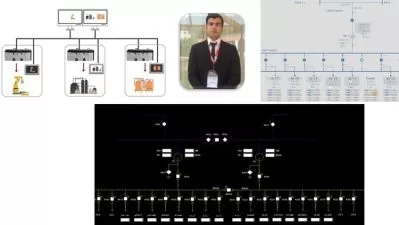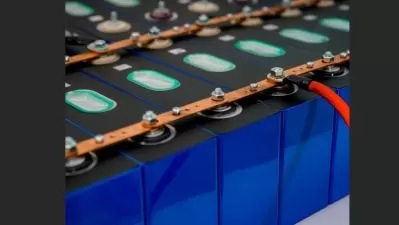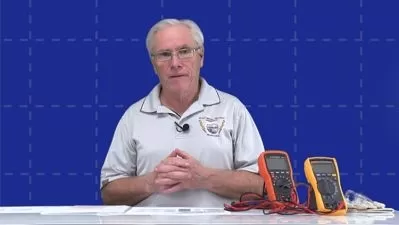Foundations of Electrical Circuits - DC Circuits
Dhreen Tulsiani
4:30:45
Description
Electrical Engineering, DC Circuits, Electric Circuits
What You'll Learn?
- Gain confidence in understanding and working with DC circuits and be prepared to further advance your knowledge in electrical circuits.
- Develop a deep understanding of the fundamental concepts and principles of DC circuits, including charge, current, voltage, power, and energy.
- Learn and apply circuit theorems, such as superposition, Norton's Theorem, and Thevenin's Theorem, to simplify and analyze complex DC circuits.
- Develop a deep understanding of capacitors and inductors in DC circuits and learn how to apply this knowledge to optimize circuit performance.
- Gain proficiency in applying various methods of analysis, such as nodal analysis and mesh analysis, to solve DC circuits.
- Understand the principles of operational amplifiers, including ideal op amps, inverting op amps, and non-inverting op amps, in DC circuits.
- Learn the concepts of first and second order circuits, including transient response and time constants.
- Develop critical thinking and analytical skills by analyzing and designing DC circuits.
- Analyze and interpret circuit diagrams and and circuit notations to understand the behavior of DC circuits.
Who is this for?
What You Need to Know?
More details
DescriptionAre you looking to build a strong foundation in electrical circuits? This comprehensive course is designed to help beginners understand the fundamental concepts and principles of DC circuits. Whether you're a student, hobbyist, or aspiring electrical engineer, this course will equip you with the knowledge and skills needed to analyze and solve simple to complex DC circuits.
This course covers a wide range of topics, including
Basic concepts such as systems of units, charge, current, voltage, power and energy
Basic laws such as Ohm's Law and Kirchoff's Laws
Methods of analysis such as nodal analysis and mesh analysis
Circuit theorems such as superposition, source transformation, Norton's Theorem and Thevenin's Theorem
Operational amplifiers such as ideal op amps, inverting op amps and non-inverting op amps
Capacitors and inductors
First order circuits
Second order circuits
This course is packed with explanations, examples and step-by-step demonstrations that will strengthen your understanding of DC circuits.
By the end of this course, you'll have a solid grasp of the foundational concepts and techniques used in DC circuits, and be able to confidently analyze and design simple to complex circuits.
Whether you're pursuing a career in electrical engineering or simply interested in understanding how electrical circuits work, this course will provide you with the knowledge and skills to take your understanding to the next level.
Course Features:
Taught by an experienced instructor with expertise in electrical engineering
Covers a wide range of topics to provide students with a solid foundation in DC circuits
Clear explanations and demonstrations of complex concepts
Includes quizzes after each section to evaluate and reinforce understanding of the course concepts
Lifetime access to course materials and updates
Certificate of completion
Who this course is for:
- Students pursuing electrical engineering or related fields who want to build a strong understanding of DC circuits as a fundamental concept in their curriculum.
- Professionals in the field of electrical engineering, electronics, or related disciplines who seek to refresh or deepen their knowledge of DC circuits.
- Enthusiasts or hobbyists interested in learning about electrical circuits, electronics, and how devices and systems work.
- Anyone seeking to improve their problem-solving skills and analytical abilities in the domain of electrical circuits.
- Individuals preparing for engineering exams or certifications that cover DC circuit concepts.
- Educators or instructors who want to enhance their teaching resources with a comprehensive course on DC circuits.
- Those who have a curiosity or interest in electrical circuits and want to learn the foundational concepts and principles of DC circuits for personal or professional development.
Are you looking to build a strong foundation in electrical circuits? This comprehensive course is designed to help beginners understand the fundamental concepts and principles of DC circuits. Whether you're a student, hobbyist, or aspiring electrical engineer, this course will equip you with the knowledge and skills needed to analyze and solve simple to complex DC circuits.
This course covers a wide range of topics, including
Basic concepts such as systems of units, charge, current, voltage, power and energy
Basic laws such as Ohm's Law and Kirchoff's Laws
Methods of analysis such as nodal analysis and mesh analysis
Circuit theorems such as superposition, source transformation, Norton's Theorem and Thevenin's Theorem
Operational amplifiers such as ideal op amps, inverting op amps and non-inverting op amps
Capacitors and inductors
First order circuits
Second order circuits
This course is packed with explanations, examples and step-by-step demonstrations that will strengthen your understanding of DC circuits.
By the end of this course, you'll have a solid grasp of the foundational concepts and techniques used in DC circuits, and be able to confidently analyze and design simple to complex circuits.
Whether you're pursuing a career in electrical engineering or simply interested in understanding how electrical circuits work, this course will provide you with the knowledge and skills to take your understanding to the next level.
Course Features:
Taught by an experienced instructor with expertise in electrical engineering
Covers a wide range of topics to provide students with a solid foundation in DC circuits
Clear explanations and demonstrations of complex concepts
Includes quizzes after each section to evaluate and reinforce understanding of the course concepts
Lifetime access to course materials and updates
Certificate of completion
Who this course is for:
- Students pursuing electrical engineering or related fields who want to build a strong understanding of DC circuits as a fundamental concept in their curriculum.
- Professionals in the field of electrical engineering, electronics, or related disciplines who seek to refresh or deepen their knowledge of DC circuits.
- Enthusiasts or hobbyists interested in learning about electrical circuits, electronics, and how devices and systems work.
- Anyone seeking to improve their problem-solving skills and analytical abilities in the domain of electrical circuits.
- Individuals preparing for engineering exams or certifications that cover DC circuit concepts.
- Educators or instructors who want to enhance their teaching resources with a comprehensive course on DC circuits.
- Those who have a curiosity or interest in electrical circuits and want to learn the foundational concepts and principles of DC circuits for personal or professional development.
User Reviews
Rating
Dhreen Tulsiani
Instructor's Courses
Udemy
View courses Udemy- language english
- Training sessions 40
- duration 4:30:45
- English subtitles has
- Release Date 2023/07/12

















